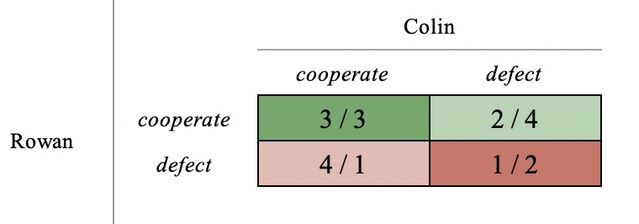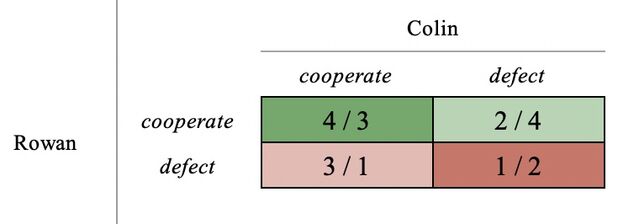Forgiveness
Guilt and Power
The invitation to feel guilt is a power trip.
Posted May 2, 2022 Reviewed by Vanessa Lancaster
Key points
- Many decisions are made without reflection or consideration of the consequences.
- People often allow their preferences to reveal themselves in their behavior only to realize that they might have wished for a different outcome.
- People can be myopic about others' preferences. This myopia is detrimental when the outcomes are interdependent on what others do.
I sent you a postcard from Roulettenberg and you never acknowledged it. That made me angry. – a friend with more memory than tact
On occasion, we – or others who do this to us – express displeasure or even anger, thereby setting the stage for an apology to be offered. If the anger is strong, its expression amounts to an attempt to induce guilt in the other party. In milder cases, a more routine apology without the elements of humiliation or submission may be in play.
The essential dynamic is the same. Each party has a choice between two strategies. One party, let’s call him Rowan, decides whether to express anger or let go of whatever the real or perceived injury was. The other party, Colin, decides whether to offer an apology (perhaps even if none was demanded) or sit tight. We shall refer to expressing anger and not offering an apology as uncooperative or defecting strategies, and to not expressing anger and offering an apology as conciliatory or cooperative strategies.
With both parties having two behavioral options, four different situations can unfold. Typically, individuals will find themselves in one of the four worlds depicted in matrix 1, only to puzzle about what happened. It is, however, possible to contemplate a potential guilt-trip-apology encounter with foresight.
Each party can mentally move through the four possible outcomes and rank them according to their unpleasantness, with low numbers representing stronger aversion. A mindful actor, or player, puts down their own preference ranking as well as what they assume to be the other’s preferences (Krueger et al., 2022).

The numbers shown in matrix 1 illustrate the preferences of two players in conflict. In each cell of the matrix, the number to the left refers to Rowan’s preference, and the number to the right refers to Colin’s.
Rowan’s most preferred scenario is to express his anger and receive an apology from Colin (4). Receiving an unsolicited apology is second-best (3), followed by mutual silence (2), and finally an unreciprocated demand for an apology (1). Rowan’s primary interest is for Colin to be accommodating (yielding the numbers 4 and 3). His secondary interest is to mismatch Colin’s choice. If Colin accommodates, Rowan would rather be angry (4) than let go (3); if Colin sits tight (defects), Rowan would rather let it go (2) than shout at a wall (1).
Colin’s preferred scenario is to not offer an apology and not be asked for one (4), followed by offering an unsolicited apology (3), followed by rejecting the demand for an apology (2), followed by submitting to a demand for an apology (1). Colin’s primary interest is to not be put upon with a demand for an apology (3 and 4); his secondary interest is to not apologize no matter what Rowan does (4 and 2).
How will this game play out? If both players come to the same assessment of their own and the other’s preferences and if both are rational in the game-theoretic sense, they will be attracted to the Nash equilibrium state of the upper right cell (2/4), with Rowan being conciliatory and Colin not apologizing on his own. Nothing happens. Colin is happy, while Rowan nurtures resentment. Yet, Rowan will not demand an apology knowing he will receive none. That would be humiliating (1/4).
When the Nash equilibrium is not realized, something must have gone wrong. Feeling the pull of his most preferred outcome, Rowan might demand an apology. It gives him a feeling of power and the gratification of having spoken his mind. This pull is strong inasmuch as Rowan fails to fully or accurately simulate Colin’s preferences. When the demanded apology does not materialize, Rowan feels let down (for the second time, with the first time being the real or perceived slight of Colin’s he is now angry about).
In short, in this version of the game, Rowan is the one who has an incentive to assert his power, but Colin ultimately holds the power. The lessons one might read into this are “Do not be afraid of guilt trips. Simply do not respond.” And, knowing this, “Do not guilt-trip your friends or associates because they have the leverage of leaving you hanging.”

Of course, the present scenario is one of many possible ones. Matrix 2 assumes that Rowan prefers mutual cooperation to his unilateral defection (his 4 and 3 are flipped). He will now more readily cooperate, making it more likely for the Nash equilibrium (2/4) to be realized than the rather catastrophic outcome of mutual defection (1/2).
This simple game-theoretic scheme can help with social decision-making. Many decisions are made without reflection or consideration of the consequences. Often, people allow their preferences to reveal themselves in their behavior only to then realize that they might have wished for different outcomes. Likewise, people tend to be myopic about the preferences of others, and this myopia is to their detriment when their own outcomes are interdependent on what others do (Krueger et al., 2018). It is critical to at least try to predict what others might want.
A rational person might wish to invest a little time to sit down and draw up a preference matrix. If impulse gets the better of them, they can still model what happened after the fact, and promise themselves to be more rational and circumspect the next time. The quality of human relationships depends on it.
Hintergedanken [derrière-pensées]
None of this is to cleanly deny the usefulness of apologies. Especially when they are not forced or demanded, apologies are a social lubricant that restore and maintain exchange as well as communal relations. An apology in the modern sense is a social ritual that is most effective when it is made to look like something other than a ritual. An apology in the ancient sense is more confrontational than conciliatory. In his apologia, Socrates pointed his philosophical middle finger at the Athenian établissement. He gave a speech of self-defense, not one of remorse – but that is another game.
For the inverse of the present topic of apologies withheld, namely apologies offered but not heard, see Krueger (2019).
I bumped into that table and apologized to it. - a trusted friend
I drew up the preferences shown in matrix 1 from a man’s perspective, ending up with the conclusion that the apology withholder has greater power. Schumann & Ross (2010) showed that women use a lower threshold when deciding whether an action deserves an apology. This can make them angrier and less powerful with unapologetic men than with other women, and it makes them more willing to offer an apology, which also reduces their power. Women's preference rankings may be different from the ones I used. Offense-apology scenarios could be submitted to men and women to see if they approach the guilt game differently and end up with different emotional consequences.
Jewish mothers, if there is truth to the stereotype, might be a special case. According to folklore, they are adept in extracting guilt from family. When playing well, these mothers wield power and gain satisfaction.
References
Krueger, J. I. (2019). Unrequited contrition. Psychology Today Online. https://www.psychologytoday.com/us/node/1134977/preview
Krueger, J. I., Grüning, D. J., & Sundar, T. (2022). Power and sociability. In J. P. Forgas, W. D. Crano, & K. Fiedler (eds.), The psychology of sociability. The Sydney Symposium on Social Psychology, 23, 198-216. Taylor & Francis.
Krueger, J. I., Heck, P. R., & Wagner, D. (2018). Egocentrism in the volunteer’s dilemma. American Journal of Psychology, 131, 403-415.
Schumann, K., & Ross, M. (2010). Why women apologize more than men: Gender differences in thresholds for perceiving offensive behavior. Psychological Science, 21, 1649-1655.




